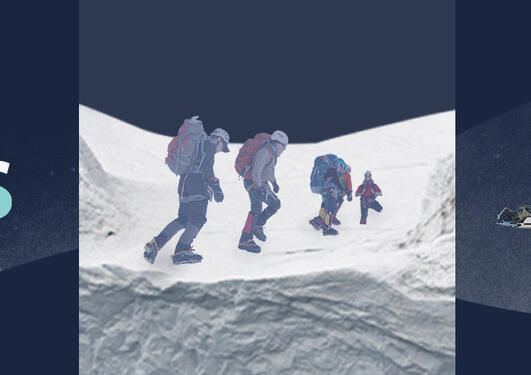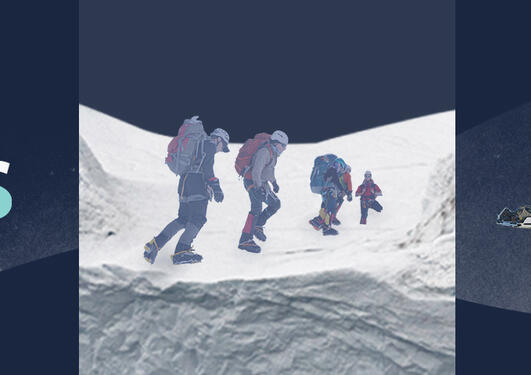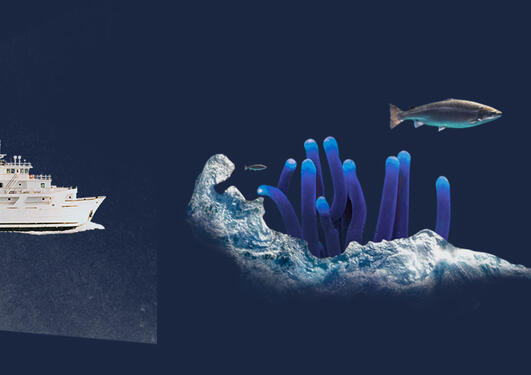Research possibilities for the MSCA SEAS postdoctoral research fellow in climate and marine biogeochemical cycling
The information on this page is a supplement to the complete advertisement of the position in the recruitment-portal Jobbnorge. The full advertisement of this position in Jobbnorge will be available from April 1, and linked from this web page. Call deadline is June 12, 2023.
Main content
Key information
| One position | MSCA SEAS postdoctoral research fellow at the Bjerknes Center for Climate research (Department of Earth Sciences) |
| Jobbnorge title | MSCA SEAS postdoctoral research fellow in climate and marine biogeochemical cycling |
| Topical frame | Assessment of the sustainability of global ocean productivity, oxygenation, and carbon sink efficiency during rapid global warming |
| Supervisor | Professor Ulysses Silas Ninnemann |
| Mobility | For an incoming candidate (see mobility rules) |
| Unit of employment | Department of Earth Sciences at the University of Bergen |
| Group affiliation(s) | FARLAB, Quaternary geology and Paleoclimate Group and the research theme ‘Carbon System’ at the Bjerknes Centre for Climate research |
Thematic area and contact
This position is connected to the Facility for advanced isotopic research and monitoring of weather, climate and biogeochemical cycling (FARLAB). FARLAB is Norway’s national light stable isotope facility, run by the Department of Earth Sciences and Geophysical institute at the University of Bergen.
Thematic research area will be assessment of the sustainability of global ocean productivity, oxygenation, and carbon sink efficiency during rapid global warming. The successful candidate will utilize the FARLAB infrastructure to address key points of the Bjerknes Centre’s Carbon System action plan through the further development of emerging analytical techniques and their application to periods of past rapid warming. Key themes addressed that are critical for future sustainability in the face of continued warming are:
- Vulnerability/sensitivity of nutrient supply to the global thermocline
- Thresholds for ocean oxygenation and related ecosystems
- Potential carbon cycle feedbacks to further warming
The position is open to an incoming candidate, see mobility rules. The successful candidate will be employed at the Department of Earth Science and included in the Quaternary geology and Paleoclimate Group as well as the Research theme ‘Carbon System’ at the Bjerknes Centre for Climate research.
Information about the supervisor and research possibilities for the fellow is available below. For further details about the research possibilities please contact Professor Ulysses Silas Ninnemann.
Research possibilities and resources
The supervisor
Ninnemann is an isotope geochemist and paleoceanographer and leader of the Quaternary geology and Paleoclimate Group at UiB. His research interests are global ranging but are currently focused on the relationship between the circulation and biogeochemical cycling of high latitude oceans and on delineating thresholds, transitions, and rapid perturbations in ocean circulation, carbon cycling, and climate. He utilizes novel analytical approaches, interpreted in collaboration with modellers and observations of the modern ocean, to quantify the (in)stability of ocean ventilation during warm(er) climates and the impact of ocean changes on ocean biogeochemistrye.g. 1,2. Ninnemann has acted as coordinator and work package leader in large international research projects and EU projects on paleoclimate and thermohaline circulation.
The research group
The position is embedded in the Research Theme “Carbon” at the Bjerknes Centre for Climate Research, the paleoclimate group at the department of Earth Science, and the isotope laboratory FARLAB. The Bjerknes Centre is the largest climate research centre in the Nordic countries with leading mullti-disciplinary expertise and infrastructures for the quantification of biogeochemical cycling in the past, modern, and future oceans.
Available infrastructure
Access to the nationally funded stable isotope infrastructure FARLAB and the extensive analytical infrastructure facilities within the geoanalytical facility are available. Collaboration with modelers and access to model (computing and data storage) infrastructures is also possible. There are frequent seagoing opportunities on UiB’s and international research vessels, including planned expeditions within the project period.
Research possibilities for the fellow - topical frame
The postdoctoral fellow position is thematically linked to the sustainability of global ocean productivity, ventilation/oxygenation, and the carbon sink efficiency during rapid global warming. Continued ocean heat uptake and related circulation and stratification changes pose potentially significant marine environmental hazards, yet large uncertainties remain about the sensitivity of ocean ventilation, oxygenation, and the sustainability of global nutrient supply to sudden and sustained warming. The candidate will constrain these uncertainties by analysing past periods of warming and stratification and by quantifying the biogeochemical response.
Possibilities for collaboration with international research environments include (but are not limited to)
University of Southampton (UK), Rutgers University (USA), UFF (Brazil), University of Conception (Chile), University of Barcelona (Spain).
Possibilities for collaboration with other sectors
This project will produce knowledge relevant for the management of marine resources, ocean health, and ocean and ecosystem governance. Particularly relevant for National and international governing bodies on ocean management, e.g., fisheries directorates.
Potential for policy impact
The project aims to provide knowledge for policy makers on the long-term sustainability of ocean primary production, the sustainable management of marine resources, and the pathways leading to potentially dangerous ecosystem stressors and thresholds.
See the full advertisement in Jobbnorge
The full advertisement in Jobbnorge will be available from April 1, 2023, until call deadline June 12.
Important general information
Please be aware
- That until April 1st 2023 (official call opening) there might be minor adjustments in the Guide for applicants and the templates needed for applying.
- That the application process is time-demanding and requires a close dialogue with name-given available faculty supervisor or contact who, close to the deadline, must sign a supervisor match declaration if an application is to be eligible.
- That some fields of research, especially within sensitive technology areas, might be enforced by Norwegian and international regulations regarding Control of the Export of Strategic Goods, Services and Technology. Candidates who by assessment of the application and attachment are seen to conflict with the criteria in these regulations might be prohibited from recruitment to UiB.


